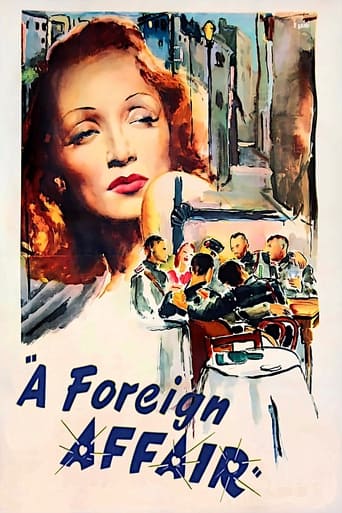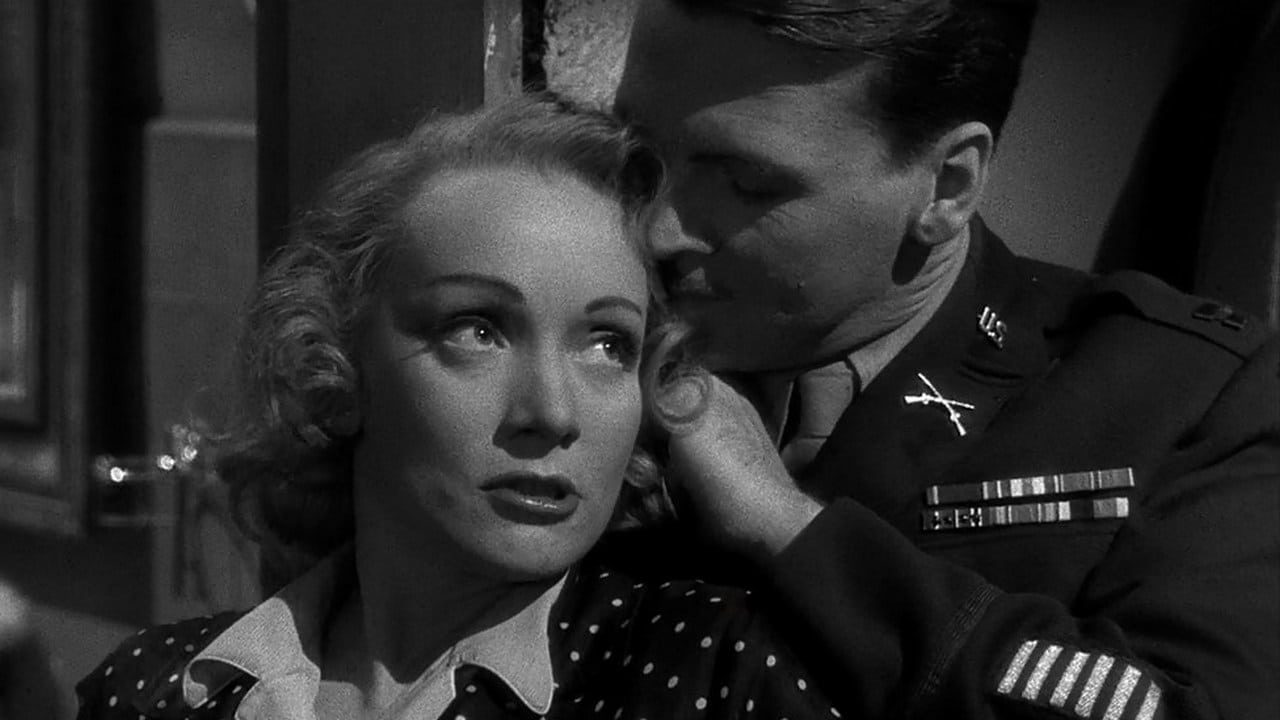DKosty123
Billy Wilder's making a farce out of this one which seems to have some jokes only he and the other writers understand. To me, the biggest value of this film is Col. Plummer's serious tour showing a lot of what bombed out Berlin was about in 1948. These parts of the film were done on location.The plot, such as it is, has John Lund (Capt Pringle) romancing Erika (Dietrich) not knowing he is being set up a a target to bring her Nazi ex-boyfriend out of hiding. Strangely enough that does not happen until late in the movie. That is because of the early plot.Congresswoman Phoebe (Jean Arthur) and a congressional group come to check out the morale of our American troops staying in Germany after the war. The investigation seems to indicate most of our troops are having affairs with German women. This makes little sense historically as the Russians had just raped most of the German women in Berlin in 1945, but because there is a shortage of German men after the war, I guess we can stretch with that.Lund and Arthur really fall into love, but Pringle (Lund) has to stay on his mission with Dietrich (Erika). Most of the movie centers around this plot, and really is not all that amusing to modern viewers. This is a good way to view a more mature Dietrich who is way past her Blue Angel days but is still able to perform. Wilder did better later as it appears his problem here is that while painting a picture of a shattered he tries to make poverty more amusing than it really is.
tieman64
Shot amidst the bombed out ruins of postwar Berlin, Billy Wilder's "A Foreign Affair" positions us to sympathise with Erika Von Schluetow (Marlene Dietrich), a German glamour queen who may or may not have once worked with the German War Office. As the US military begins its occupation of Germany, Erika works nights at a local club, where she sings sad songs of regret. The patrons love her, but a US congresswoman, played by Jean Arthur, wants her apprehended.Wilder's film functions as both a hymn to the fallen and a demand that the Axis and Allies stop slandering one another and fess up to the suffering each has wrought. It's not one of Wilder's masterpieces, but his trademark cynicism shines through all the same.Dietrich - who hated Wilder's script and took the part only to pay her bills - is excellent as Erika. Her character's a poor gal struggling to get by, latching onto whatever occupier dares claim her body as post-war bounty. Jean Arthur's her nemesis, a stickler for rules and regulations who balks at post war, trans-Atlantic love affairs, be they literal or political. 7.5/10 – Once daring, now dated. Worth one viewing.
Marcin Kukuczka
Let me state this at the beginning: I am not a particular fan of post-war movies because WWII was a very infamous page of history. Whenever I encounter a story from that period, I prepare myself for heavy experience and get loaded with hard reflections. However, A FOREIGN AFFAIR has been one of the exceptional movies. Being inspired by the original story by David Shaw and masterfully directed by genius director Billy Wilder with the clever screen play by Charles Brackett, the film stands out as a unique production. Although the action is entirely set in the 'ruins of Berlin' where people suffer the consequences of the war, one gets an unforgettable insight into the characters. Through the authentic depiction of the times, we are led to certain characters in a natural manner, the characters who act differently; yet...something links them...something that you, as a viewer, must find out yourself.To start with, let me refer to the major idea of the plot because without it, I would not be able to discuss the core point of the story. The American Congress sends a committee to the divided Berlin where they are supposed to investigate the morale of American soldiers. In other words, their task is to eliminate the 'moral malaria' that, according to the great legion of decency, is more dangerous than anything else. Among them is a charming lady, Ms Phoebe Frost (Jean Arthur) whose determination in questioning will soon turn into passion in kissing. And...what they discover in the ruins of Berlin is an outrageous scandal that resembles the very violation of the law, the very default of moral decency - immoral bars with 'forbidden entertainment.' It occurs the the infamous Lorelei bar is visited by American captains... Isn't the fact about Republicans being kissed by former Nazi women truly subversive?The change that is depicted in Ms Frost is a clear message of the movie which says openly: desires far beyond regulations, humanity far beyond the law, the mutual far beyond the divided. From today's perspective, we look at it in a different way; this idea is more obvious to us. But in 1948 when the division of Berlin was the new political situation, it demanded a great courage to make such a film! That aspect which so authentically manifests the German situation after the war was nicely executed in the scene between Phoebe and Captain Pringle - their first love moment in fact. Being angry about the amount of work she does for investigation, Pringle asks her what she does anything for normal human reactions like laugh or tears. Then, in the witty moment, the shelves trap the young fragile beauty and... they kiss. Here, her rules give in at last! New York Times reviewer Bosley Crowther praised the job of the movie by saying: "Particularly, their interest is in how human beings behave when confronted by other human beings—especially those of the opposite sex. And their logical conclusion is that, granted attractions back and forth, most people—despite regulations and even differences in language and politics—are likely to do toward one another that which comes naturally." That aspect is also memorably revealed in two of Ms Dietrich's famous songs: "Illusions" and "Black Market." The songs occur to manifest the romantic aspect of the movie but also 'its vagrant cynicism and its unmistakable point." (Crowther).Not much would be achieved if it weren't for the performances. It is another Marlene Dietrich's stunning achievement under Billy Wilder's direction. Here she portrays a realistic woman, a German woman who does not give in in spite of the harsh reality. The role of Erika Von Schluetow was, in fact, the role for Marlene because she loved Berlin and she loved the right German spirit which, paradoxically, does not have much in common with the Nazi monstrosity. Her role remains in the memory of a contemporary movie buff as the depiction of the sensual woman rather than a former Nazi, who becomes even more sophisticated and glamorous in the eyes of other characters. She is at the center again, a similar entertainer like in DER BLAUE ENGEL; yet, a differently experienced 'sex symbol' Her appeal is strong enough to put the legion of decency onto its knees. Her scenes leave the viewer breathless, her songs are unforgettable reaching their climax, of course, at the final song "in the ruins of Berlin." Her first moment rewards you with wit... teeth brushing followed by a splash of... 'indecent behavior.' John Lund is fine as Captain Pringle, natural with the right sense of humor and a great flair for teaching young ladies how to yearn for his lips and how to investigate the bottles. Jean Arthur is a revelation in the role that required from her a great challenge: how to portray A CHARACTER that experiences the 'metamorphosis'; in other words, how to portray TWO CHARACTERS? She does it wonderfully becoming equally captivating in both incarnations: as the restrained letter of the law and as a genuine human being. I will never forget her hilarious moments as Gretl who knows one German word "Javol!" Finally, I would like to focus on one more aspect that perhaps has not been quite popular among the critics but occurs to be of significant meaning. Since Germany (Third Reich) was responsible for WWII, not many people concentrated on their suffering. In fact, the suffering of Berlin was quite ignored, seen perhaps more as a 'punishment' for the Nazi system. Yet, was the whole nation guilty? A FOREIGN AFFAIR is a revelation in the sense that it truly speaks for the German nation which, though caused divisions, was at the same time a bridge among people. Great script, wonderful performances, flawless direction and an interesting insight into the post-war Berlin, a city that ALSO suffered. In the ruins of Berlin, a new spirit was born and the song goes on telling us stories of unique dreams, desires and foreign affairs...
Alex da Silva
The women steal the honours in this film about a soldier John Pringle (John Lund)who has a lover Erika (Marlene Dietrich) in Germany but falls for a Congresswoman Phoebe (Jean Arthur) who is on a 5-day stay in Berlin investigating morale and morals within the US army. Jean Arthur is funny, determined and innocent while Dietrich is sexy, stylish, streetwise and playfully wicked. The story has humour and sadness and it ends well for all parties, but it is the acting of the 2 lead women that makes the film worth seeing.As usual, Dietrich sings some rubbish songs but it doesn't get in the way of the film and she wears nice sparkly outfits which takes the attention away from the music. My favourite scene is when Dietrich and Arthur are in a club that gets raided and Dietrich points out a few home truths. Jean Arthur makes you feel genuinely sorry for her and it's a good contrast to the humour which has gone beforehand. There is also a story about a jealous Nazi who is coming to dish out some revenge to John but this thread is only picked up in the latter stages of the film. It's quite a long film but it's enjoyable enough to watch again.


 AD
AD




